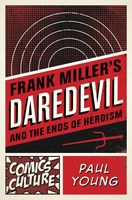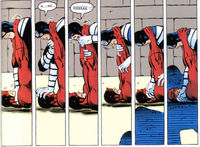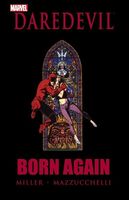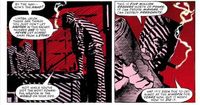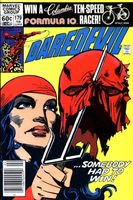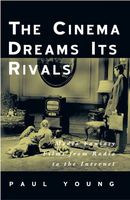Son of a Preacher Man
By Koom Kankesan
Paul Young is the son of a Lutheran minister. As a good minister will endeavour to bring Heaven and Earth a little closer together, through works and deeds, Paul effectively closes the distance between academic and personal writing. In his book Frank Miller's Daredevil and the Ends of Heroism, he passionately draws out and dissects Miller's work on the legendary Daredevil run.
Paul's book is like no other academic work I've read. An exegesis of dynamic forces and stylistic innovations, it explicates Miller's dialectics, but is also a paean to childhood: cycling to town to pick up long awaited new issues, copying the covers adorning those four colour icons of worship, the fueled drawing into existence of an apocrypha that is one's own. This passion project of Paul's leaves trace emotion upon every page. His devotion to a project that runs counter to that which is fashionable in academia fascinates me.
I relate to his childhood pangs, the comics worship from afar, the desire to voyage into a universe of panels and speech balloons. Paul became a film studies professor at a prestigious university in the States. I became an exhausted high school teacher, producing overlooked fiction, in Canada. This seemed like an opportunity to me, too good to pass, to wag chins and shoot the breeze: everything from Daredevil to Frank Miller to comics in the 80s, and why we loved 'em.
Koom: As you know, I'm a big fan of your recent book Frank Miller's Daredevil and the Ends of Heroism. Although I did my Master's in English and Film Studies, I'm not really fond of academic writing, and academia in general. Yet, your book is fiercely personal and passionate while also being a formal study. I'm thinking of your 'exorcism' chapter in particular. Perhaps you could tell our readers a little bit about it and what the academic reaction to it has been so far?
Paul: What reaction? (laughs) I'm sure there will be one, but I'll have to wait a while. So many academic books are published every year that it takes months, sometimes years, for books to get reviewed by scholarly journals. The wheel turns very slowly.
That said, I'm ambivalent about how the exorcism chapter will be received. I want readers to engage with it, obviously, but it's going to turn some readers off. My editors and I knew that. I told them that people would either love it or hate it, but that I'd rather cultivate extreme reactions to a stylistic choice than bore everyone with the same old mode of argumentation. What's weird about the chapter, as you know, is that it's written as a cross between a catechism, complete with questions and answers, and a temporal wormhole that allows me to "converse" with my thirteen-year-old self about Daredevil #181, the issue in which Miller has Bullseye kill Elektra. The catechism aspect of it is a shout-out to James Joyce on some level, but that's not why I chose to frame it that way. I did it because my upbringing as a Lutheran, and a pastor's kid to boot, organized my sense of moral rightness and ethics about as tightly as Miller strung Matt Murdock's sense of Christian moral choices.
My greatest concern was to give that younger version of myself a chance to assert what *he* found so engrossing about that issue in particular. Very little academic criticism of mass culture factors in how fannish absorption into a comic book character or a creator affects the texts themselves and how they are read. Critics talk about fan culture, but they do so in terms of what fans do with their adulation for characters or star creators, not in terms of how it overdetermines the very experience of consuming the work. I tried to get at that experience from the inside, more than three decades after the fact. I don't know if it works, but I don't regret publishing it. I needed to do it.
Your CanLit News
Subscribe to Open Book’s newsletter to get local book events, literary content, writing tips, and more in your inbox
Koom: it definitely works! One of the reasons why I didn't wish to become an academic is because academia elides that sense of experience and sensation that we talk about. We are jazzed into things on emotional as well as intellectual levels. I felt that writing fiction could address that totality of self. What I liked about your book was the way it brought those two approaches (the personal and academic) closer together.
I want to go back to your identification with Miller's Daredevil during the 80s. I think that in the same way that Indiana Jones became a father figure and role model to a certain generation, Miller's Daredevil fulfilled that function for me. There was something pure about him, but he was also broken and pained and troubled. He suffered on the level of the soul. Not some Stan Lee-like fake suffering, but the real deal. He was an American Lancelot, a character out of a Leonard Cohen song. This goes beyond the calculated Irish Catholic matrix that Miller employed. DD was fatally human. Those stories had a primal, literary flair. I don't think anybody's been able to capture that since. Not the Netflix Daredevil series, none of the writers who handled Daredevil after Miller, not even Miller himself. Do you feel the same way or do you disagree?
Paul: I agree, but I also think that the Leonard Cohen quality you're talking about would get awfully old after a while with a continuing, corporate-owned character like Daredevil. When a writer or artist, or in this case the writer-artist, leaves a superhero book, post-Silver Age fandom wants continuity, I think. When I was 11 or 12 and John Byrne left X-Men, I really and truly wanted everything to stay the same. I wanted a Byrne clone, and I wanted Chris Claremont to plot stories just like the ones he plotted with Byrne.
But I didn't know or care what that would mean. Same characterizations? Same visual style? Same Dark Phoenix storyline? Well, we got that, didn't we? Several times! But looking at it today, from the perspective of an old codger, I don't think you can squeeze aesthetic value out of keeping up exactly the same mood or characterization or visual style from creative team to creative team. The concept just goes flat after a while. Miller gave Ann Nocenti a gift when he and David Mazzucchelli destroyed Matt Murdock's career as an attorney and left him to be Daredevil and only Daredevil for the next team to deal with. I am not a huge fan of what she did, but she dealt with Matt's humanity differently, I would say more directly than Miller did, because the character and his environment were so stripped down. She turned his fatal humanity into an opportunity for him to play Dante to Nocenti's Virgil for a few years. He met the devil - the real one, or at least a real one! I know some fans have a penchant for D. G. Chichester's work on the character, particularly when Scott McDaniel drew the series, but what Chichester did was imitate Miller's tone and characterization too closely. First he wrote scripts for the very skilled Lee Weeks, who imitated Mazzucchelli through a flip of Born Again in which Kingpin was the one who lost everything. Then he and McDaniel went into full-bore Miller mode - or so they thought - and brought back Elektra, complete with those giant lips made entirely out of hatch lines.
This was the nineties, and McDaniel appears to have been trying to do what Miller was doing with negative space in Sin City at the time. But that Elektra story was wretched. It was as though they were trying to reprise Miller visually and narratively without producing any character for Murdock at all, let alone Miller's existential Murdock whose hubris is that he doesn't know he has any. Like I said, it was the nineties, and the editorial emphasis at Marvel was on exploding page layouts and hot guest stars. Honestly, it's only when Murdock has become the writer's focus that the book has regained traction. Bendis revisited Murdock's lack of self-knowledge but placed it in a kind of Elmore Leonard version of a noir/gangster environment, which turned out to be a very productive mash-up. Mark Waid switched DD from being a cipher to himself to being a complete mystery to us, the readers - again, a kind of riff on Miller's work, but so different as to breathe some surprisingly fresh oxygen into the character. Miller effectively detoured around the continuity approach to writing corporate-owned characters, without losing anything that made Daredevil unique, and adding a good many strengths - his deeply held Catholic beliefs, for example, which built a fabulous superstructure for DD's ethical decisions - as well as foibles. Daredevil had few basics to return to, and Miller nurtured that blankness into a spectacular advantage. And his doing so set up a historical pattern in which every ambitious writer-artist team on the series has wound up doing something similar.
But thinking a little more about the father-figure aspect of your question, Koom, I realize that I idolized the character to a degree, but not as much as I idealized Miller at that time. I wasn't just a nerd. I was a meta-nerd. I had this searing desire to be a cartoonist myself, so I was constantly hectoring myself with the question, what is Miller trying to do here? Why did he decide to replicate an unusual panel layout for three or four pages in a row? The problem was that I lacked any language at all for even asking those questions in an artistically productive way. The experience of reading comics was so organic back then that I just couldn't analyze Miller's decisions as decisions ABOUT anything in particular. I just knew that they carried me away and made me wonder what goes through a sophisticated cartoonist's mind. Today I would say that his storytelling is what grabbed me by the throat and refused to let go, but that's only the beginning of what I dimly understand my past self to have been thinking about.
My one and only superhero role-model was Cyclops of the X-Men. No question. All that thought-balloon introspection Claremont used to write sounded so much like how I overthought my every action and reaction that I figured if that's what it takes to be a superhero, then I'm halfway there already. Now I just need to be bitten by a radioactive genome.
Koom: There's a lot to think about. Two things come to mind: 1) you're much more versed in the DD run than I am. I gave up during the 90s around the time of Chichester/McDaniels. The things you've said about Chichester trying to ape Miller but failing agree with my point, I think, in that mainstream comics never were able to follow the literary flair they briefly created in the 80s. Maleev's art is nice but Bendis, Jeph Loeb, and especially Kevin Smith's work on DD never did anything for me. I liked Nocenti's run because it was do different from the rest of the Marvel bullpen and it was downbeat, but it was also turgid and you could see the various strings being pulled while Miller's work just... sings.
2) It's obvious that you've thought about comics to a very high degree, much more than me, and as you've mentioned, you wanted to be a comics writer/creator yourself. Yet, on the other hand, you've got this dream professorship - you're researching comics and movies at a pretty prestigious institution - Dartmouth. Do you feel conflicted at all about these different parts of you? Is there tension? I will say that your recent Daredevil book does much to resolve these tensions. It bridges the gaps between academia and popularity, between intellectualism and entertainment, between fandom and scholarship in an unpretentious, unassuming, passionate way. I couldn't see Bart Beatty or Chris Ware doing what you do. You've brought analysis and creativity together within the framework of academia.
As for Daredevil: Born Again by Miller and Mazzuchelli, what can I say about it that other people haven't said better? I accidentally stumbled across it in grade seven/eight and it had a profound, disturbing effect on me. That and Alan Moore & Brian Bolland's Batman: The Killing Joke knocked me into puberty during grade eight, I think. The seeds of disruption were planted then. They wouldn't ripen until the end of high school when I wanted to become a writer and understood what these works did to me. Much of what you describe about Miller's effect on you at a young age, but not being able to articulate it, really rings true with me.
Let me just drop in three examples of the writing from Daredevil: Born Again - Miller's words:
Daredevil: "Winter hits Manhattan like an unwanted relative. Drops in with no warning and seems to stay forever."
About The Kingpin: "The world seems flooded with sunlight. Daily business becomes a joyous, childlike game. He has disgraced the only good man he has ever known. This is his triumph of the spirit."
J. Jonah Jameson (waving a rolled up newspaper at Ben Urich): "This is five million readers worth of power. It can depose mayors. It can destroy presidents."
And the last quote was J. Jonah Jameson - J. Jonah Jameson!!!
Paul: Referring back to your first comment, I couldn't have put it any better. The mid-Bronze Age (approximately 1979-83) strikes me as the last moment, at Marvel anyway, at which a creator could sneak up on a preexisting series and do an amazing job of it by being as professional as possible, as comics professionalism was defined then: quick, efficient, with scarcely a superfluous line to get in the way of clear storytelling. Once Miller took up scripting on Daredevil, it turned out he wrote that way, too. Always going for the effect on the reader, not grinding any particular axe.
As for your question about college teaching and writing about funnybooks, as my grandmother used to call them... I'm lucky. I'm lucky to live in a time at which mass culture studies has become normalized to such a degree in the academy that I didn't even feel compelled to stick up for "comics as art" in my book. I felt I could skip all that special pleading and dig right in the way one digs into Wilde or Woolf or Eliot without having to justify writing about it in the first place. That's immensely liberating, and we have several brave generations of scholars and critics to thank for that legitimacy, among them my editor Corey Creekmur - always an unapologetic and brilliant writer about what used to be considered junk culture.
As I mentioned earlier, there aren't yet any academic reviews of the book. I'm expecting at least a few of them to berate me for taking too "glib" a tone for a scholarly study of comics, or anything else. Worrying over that criticism has forced me to plot out an answer: Geez, haven't you read anything by Scott Bukatman lately? He's a bona fide film scholar, a full professor at Stanford, and he's been using writing style to articulate his pleasure in comics and SF for years without sacrificing scholarly rigor. Now, his writing's not to everyone's taste either, but I appreciate his conversational approach to writing not only because it's a pleasure to read it, but because it expresses something fundamental about fandom of any form of mass culture: affection. If we're going to interrogate comics, as a field, we have to interrogate that affection as well - its nature, how it gets used as circuitry for forging friendships and conflicts and fan communities. I certainly wouldn't demand that everyone in comics scholarship focus on fannish affection or try to channel it in their scholarship, but I think there has to be a place in the field for such expressions -and critical interrogations - of that pleasure.
Speaking of pleasure, I always got a kick out of Miller's take on Jonah Jameson. Denny O'Neil wrote a Spider-Man annual (#15) with Doc Ock and the Punisher, and though Miller and Janson did the art, the JJJ we saw there was very much the traditional one: a yellow journalist, Spider-Man hater, and all around asshole. But when Miller slipped him into Daredevil, as in #179 ("Spiked!"), he always wrote him as the Ben Bradlee of Marvel's New York, always reminding Ben Urich to quadruple-check his sources, but run with the stories he stood behind, no matter how much blowback the Daily Bugle would suffer once it hit the streets. He was journalistic integrity personified. Why did Miller upend the type? I think it's a good example of a creator needing a second character - any character would do - for the protagonist (Urich, in the case of DD #179 and large chunks of "Born Again") to talk to. In comics as well as film, one needs to externalize internal character conflicts as much as possible so the audience isn't overwhelmed by voiceover. Allowing a character to bounce her or his impulses against an opposing view dramatizes an internal conflict that a novelist or playwright could simply represent as an internal or external monologue. Did I mention that Miller was really, really good at his job?
Koom: I think you may have mentioned that one or two times. Besides being an inspired and gifted orchestrater of action and character, Miller is also amazing with sensory details. Little delicate details, like the rustle of newspapers, or the ache of muscles, or the smell of an old gym, carried tremendous weight.
Paul: Yeah, I repeat myself a lot! But that point is worth reiterating.
Koom: I'd never made the connection between JJJ and Ben Bradlee but I did notice that Miller in Daredevil: Born Again really adds a dimension of depth to characters. Captain America, for instance, tinged with sadness, realizing the edge of emptiness within the American Dream. You could take that character and put him in Trump's America and he would work just fine.
In terms of what you say about fan emotion, I would just add that not only does fan culture and populism fuel the comics and film industries BUT it also fuels the creative aspects of these industries. Miller and everyone else in his generation wanted to get into comics because they were rabid addicts themselves as kids. Those energies have certainly shaped the medium. Therefore it's strange to ignore them - their account rounds out scholarship. Do you think that you will continue to write in this vein (whether it be comics or film) as you progress in your career? I think there's a very strong political and aesthetic movement to be fostered there - to bring academic and personal writing closer together.
Paul: I don't doubt I'll write conversational criticism again in the future, particularly regarding comics. But I have to say, also, that I enjoy reading "straight" scholarly text too, as long as it's written well. There has to be a place for both, even if their readerships differ.
There is great scholarship coming out right now that does, in fact, engage with how the contexts surrounding comics and comics reading affect the meanings of specific comics as well as comic art in general. Scholars are weaving together accounts of comics as texts with accounts of the histories of READING comics, and how comics inflect reading practices and vice versa, if that makes any sense. Christopher Pizzino's Arresting Development takes on the way creators of the past quarter-century or so have confronted the cultural illegitimacy of comics as a medium. Hillary Chute has done marvelous work on how the autobiographical impulse in the work of female underground cartoonists as well as Alison Bechdel and Marjane Satrapi illuminates the history of comics, caricature, and how breaking with cartooning conventions engages those conventions more than it exiles them. I'd just like to see a lot more of such work, and I'm sure we will.
Koom: While I have you here and can buttonhole you, I think I've mentioned my pet theory to you before? I think the same revolutionary aesthetics that worked their way through American movies in the 70s (the Brat auteur driven stuff) - before disappearing - worked their way through American comics in the 80s. Now, in the movies, this was due to the collapse of the studio system and companies taking more chances until Heaven's Gate ruined the party. I don't think the same thing happened in comics but perhaps the influence of the movies from the previous decade brought about changes in comics? Just like French New Wave and Italian Neorealist films influenced Americans?
That wave of aesthetic revolution (the grim and gritty character naturalism, the issues-based writing) in American comics died out too. As with movies, things became shiny and flashy and now, escapism seems to be the thing. American movies and comic books are not just bedfellows now: they've signed a mortgage on the house. As a comics and film scholar, I'm curious what you think of my pet theory of waves of influence passing from film into comics with a delayed transmission?
Paul: I'm tempted to agree with your pet theory about the New Hollywood and the generation of fan-creators that made the Bronze Age similarly experimental and less inhibited. But I don't think I can board that ship completely. In the American sixties and seventies, bucking conventions and questioning authority weren't just a political reaction to the Cold War and Vietnam. They were an integral part of consumer culture. Capitalism was all over the counterculture like a cheap suit from the moment that the counterculture was a recognizable reality. Tom Frank's book The Conquest of Cool takes a pretty cynical look at "boundary-testing" as it manifested itself in mass culture and fashion, but he's not wrong. Hollywood and the periodical press both exploited tuning in, turning on, and dropping out as much as they possibly could, and they relied on younger creators to do that for them. The filmmakers who grew up watching classic film noir on late-night TV, the comics creators who dropped acid and loved underground comix and wanted to play around with "straight" corporate characters - they got a chance to play, all right, but only so long as it was profitable. Sure, many cartoonists were influenced by the New Hollywood, but I think we're also talking about a major trend in mass culture more generally in which questioning the authority of the police, the government, and even the decades-old conventions of comics - and movie-making - were good business.
This is not to say that Coppola or Miller didn't create some truly subversive works of art - surely they did. But once the US retreated into the thicket of Reaganism, mass culture scrambled to recoup the old us-vs.-them template that had served them so well for decades prior to the sixties. That's a vast oversimplification for which I deserve to get in trouble, but if there's anything correct about it, it doesn't disprove your theory so much as it contextualizes the similarities between film and comics.
The views expressed in the Writer-in-Residence blogs are those held by the authors and do not necessarily reflect the views of Open Book.
Koom Kankesan was born in Sri Lanka. While his family lived abroad, the civil war in Sri Lanka broke out and this caused them to seek a new home. They eventually settled in Canada and have lived here since the late eighties. He has a background in English Literature and Film Studies. Koom contributed arts journalism to various publications before becoming a high school teacher in the Toronto District School Board. Since working as a teacher, he has taken semesters off now and again to work on his fiction. The Tamil Dream, his new book, is his most ambitious to date. It looks at the end of the civil war in Sri Lanka and how it affected Tamils here in Canada. Besides literature and film, Koom has deep interests in history and science, and an enduring love for comic books.
You can write to Koom throughout January at writer@open-book.ca.
